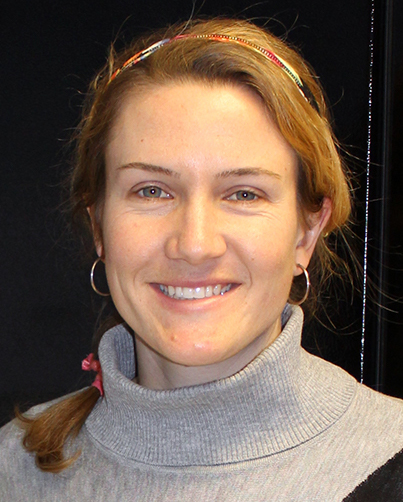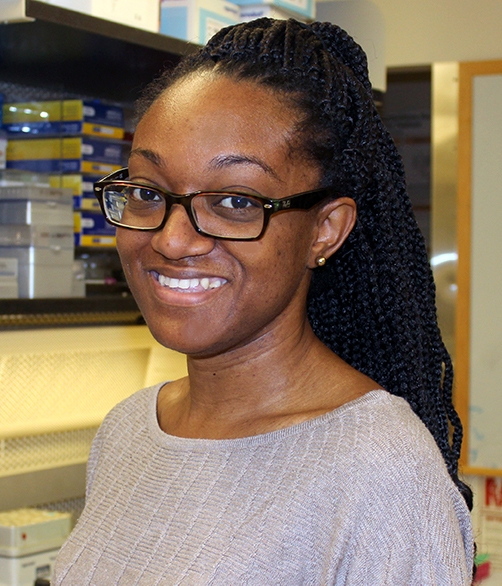Welcome to the third installment of our series on Monell’s postdoctoral fellows. We persuaded two more postdocs to put down their work for a few minutes to talk with us about everything from food to Philadelphia’s winter weather.
Click here for past postdoc interviews: Meet the Postdocs: Part 1 and Meet the Postdocs: Part 2.

Molly Spencer, PhD, received her doctorate in Food Science from the University of California, Davis. She currently works in the laboratory of Pamela Dalton, PhD, studying how taste, smell, and chemical feel (chemesthesis) influence each other and how their interactions affect flavor perception.
Q: You have a doctorate in food science. What exactly is food science?
Well, food science falls somewhere between growing food (agricultural science) and ingestion by humans (nutrition). It includes other basic sciences, like chemistry and formulations (food chemistry), processing parameters (food engineering), and quality assurance (food microbiology). Then there’s sensory science, which is at the intersection of food science and nutrition, which examines how and why people select and enjoy food.
Q: And how did you find out about Monell?
It was when I was reading Michael Moss’s book “Sugar, Salt, and Fat.” The author kept citing different Monell scientists, and I found myself thinking, “Oooh, I really like the work they’re doing there.”
Q: Did that inspire your decision to study food science?
I actually studied food science as an undergrad, before I even read that book. Then I took a year off to work in the pharmaceutical industry and… didn’t enjoy it, so I left and went to graduate school for my PhD in food science.
Q: How did you find your way to Monell?
So food science has a number of different disciplines – I chose more of a sensory and consumer track. When it came time to start looking at postdoctoral programs, I sought out Monell. I wanted to expand my horizons and be surrounded by different types of scientists, not just food scientists. When I came for my day of interviews, I really enjoyed my conversation with Pam – we had a lot of overlapping interests. I knew I was going to learn a lot from her. And because Monell is focusing more on sensory nutrition, I was a good fit for them, too.
Q: Did you always want to study science?
No, actually, I didn’t! I was always really interested in food, and I was always really good at math, but I didn’t know I could do both. I was kind of deterred from science when I was younger because I don’t love all the branches of science. I like chemistry but biology is harder for me.
Q: What changed your mind?
I figured out that as long as you understand the fundamentals of science, you can specialize in a field you actively enjoy.
I actually started as a Biomedical Engineering major in undergrad, before turning to food. Then I was debating between Food Science and Nutrition. I ultimately chose Food Science because I felt I could make more of a difference that way. Nutritionists help their individual clients, whereas as a food scientist I could affect whole communities through the food industry. The other thing I like about sensory consumer science is that you generate large data sets, so I get to do both math and food – my two favorite subjects.
Q: What’s your project’s goal?
I’m looking at sensory interactions that might enhance flavor. Ultimately, I’m hoping to develop strategies to help people cut back on potentially unhealthy ingredients that we currently over-consume, like salt and sugar.
There has been a lot of research into taste/odor interactions, and not as much into taste/trigeminal interactions, so that’s really interesting to me. And, of course, other interactions that involve all three chemical senses.
Q: Do you have a favorite food?
I love Thai food because of the spices/flavors and Italian food because of the carbs! Pizza is my all-time favorite because it is so versatile and delicious. I once ate nothing but pizza for a month and blogged about it.
Q: Do you have a favorite sports team in Philly?
Actually, I’ve been a Sixers fan since Allen Iverson played, even though I didn’t live in Philly until starting my postdoc!
Q: Would you encourage younger people to go into science?
I would – it’s an exciting field to be in. People sometimes think of math and science as being more logical, less creative disciplines, but you can definitely be creative in science. You think up a question, like “why” or “how does this work,” and then you find ways to explore and uncover the answers. How incredible is that?

Genevieve Bell, PhD, received her doctorate in Neuroscience from Florida State University. She works with Michael Tordoff, PhD, studying how changes in diet can affect taste receptors in the intestines.
Q: So what brought you to Monell?
I knew that Monell was the premier institute for smell and taste research. I was doing my PhD work in olfaction and metabolism, so I was reading papers from Monell and presenting work at the AChemS annual meetings (that’s the Association for Chemoreception Sciences – the big meeting for researchers in the chemical senses). I was the student representative on the AChemS executive board, with Joel Mainland, actually.
It’s funny, because I got to Monell through AChemS but I almost didn’t study the chemical senses at all.
Q: Really? What did you study as an undergraduate?
Psychology.
Q: And how did you go from studying psychology to olfaction?
That’s a long story! To be honest, I didn’t even start in science. When I first started taking undergrad courses at community college, I had planned to study film.
Q: Film? Like directing?
Exactly. I started making films in elementary school, and kept going through middle school and high school. I even won some awards! I wanted to direct music videos on MTV.
Q: So what happened?
I got tired of it by the time I was 16! So I decided to do psychology instead. Friends always came to me with their problems, so I was thought it would be a good career for me. But then I hated Intro to Psych, just hated it. It was a recitation of symptoms and diagnoses. I wanted to understand why. I wanted to combine biology and psychology somehow, but I didn’t know how.
Then I went to Florida State as a junior, and I took an introductory neuroscience course. And I realized, “Neuroscience. That’s the word. That’s the word I was looking for.” And that class started me on my science career through an…unusual path.
Q: What kind of path was that?
Well, it started with me studying rat breeding behavior.
Q: Sorry…what?
The instructor for my Intro to Brain and Behavior class was a graduate student in a lab that studied sex behavior in rats. I asked to volunteer in that lab, and they accepted me. So, I spent a reasonable amount of time observing how different substances affected rats’ mating behavior.
Q: Ok, so that’s how you got into science. But how did that turn into studying olfaction?
I eventually worked as a tech in that lab, then started graduate studies on rat sexual behavior… until the lab lost funding in my third year of grad school. I had gotten interested in the chemical senses when learning about pheromones – certain chemicals that animals use to communicate – and then I met the woman who would become my PhD mentor, whose work focused on olfaction and metabolism. I had never known there was a link between metabolism and olfaction! So from there, I learned more about the chemical senses and I thought, “Okay, well, this is pretty neat.”
Q: Did you have to start your graduate studies over?
Yes. I spent nine years in grad school, three in the lab that lost funding, and six in the lab I ultimately graduated from. There were multiple points where I thought, “You should just stop.” But I kept reminding myself that I came to graduate school for a reason. And I finally got my PhD!
Q: How did you find your way to Monell?
My PhD advisor received an email from Monell – people remembered my presentations at AChemS and they were looking for postdoctoral fellows.
Q: So you moved from Florida to Pennsylvania. How have you been adjusting?
Well, I’m originally from Miami, and I was in Tallahassee for 13 years before moving to Philadelphia, so I’m used to Southern hospitality. Philly doesn’t have a lot of that. But it does have snow. I ruined my car this winter because I didn’t know how to properly remove snow from it. I was just thinking, “Get this stuff off of my car!” and I scraped it off and scratched everything. I have a snow brush thing now.
Q: What are you working on in the lab?
Mike Tordoff, my postdoc mentor, works mostly in animal behavior, but I developed a rodent allergy during grad school so I can’t work directly with mice. Instead, I’ve been working with Peihua Jiang to grow instestinal organoids – organoids are a simplified, 3D form of an organ that we grow in a dish. I’m hoping to study the taste receptors that we know are in the intestines, and see how changes in diet affect those receptors.
Q: Was science something you were always interested in?
To be honest, when I was growing up I didn’t know there were advanced career options beyond medical school and law school. It was only when I was in college and volunteering in the rat mating behavior lab that someone suggested I think about going to grad school to become a scientist. I had always liked science, I just never thought I was good enough to do it. And also, when I saw scientists in textbooks, they never looked like me. So it was just never a thought I had growing up.
And then science just kind of happened to me! And I’m really glad it did.
Q: You’re a scientist!
I’m a scientist! I’m still getting used to saying it, but yes! I’m a scientist, and I science.

